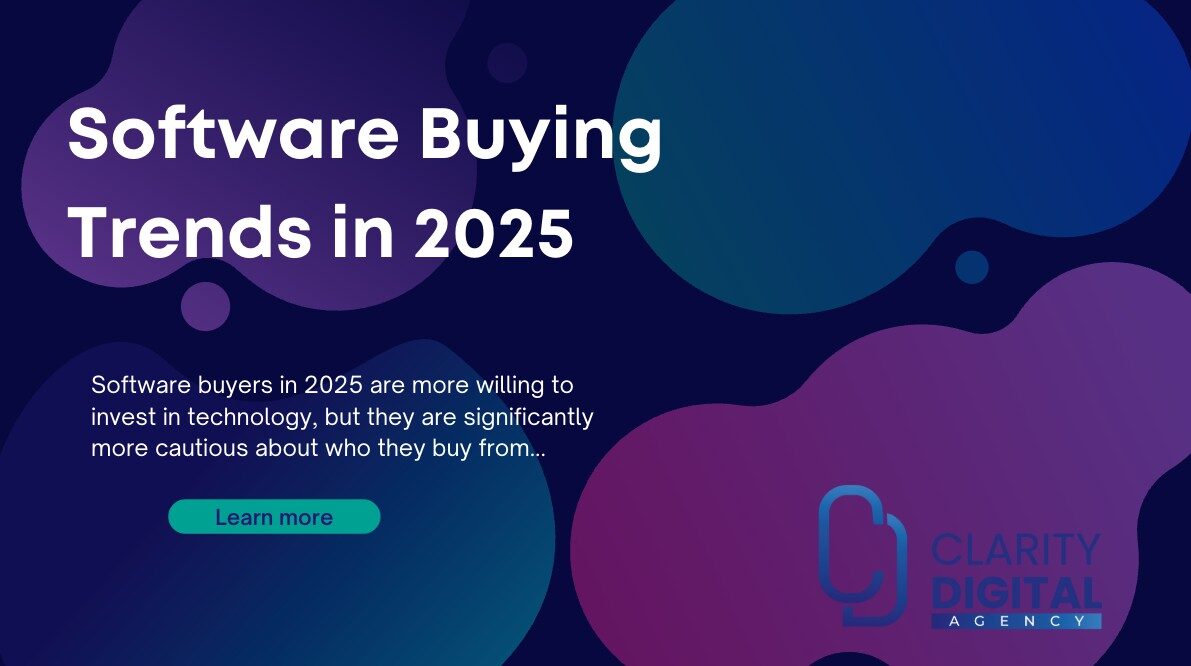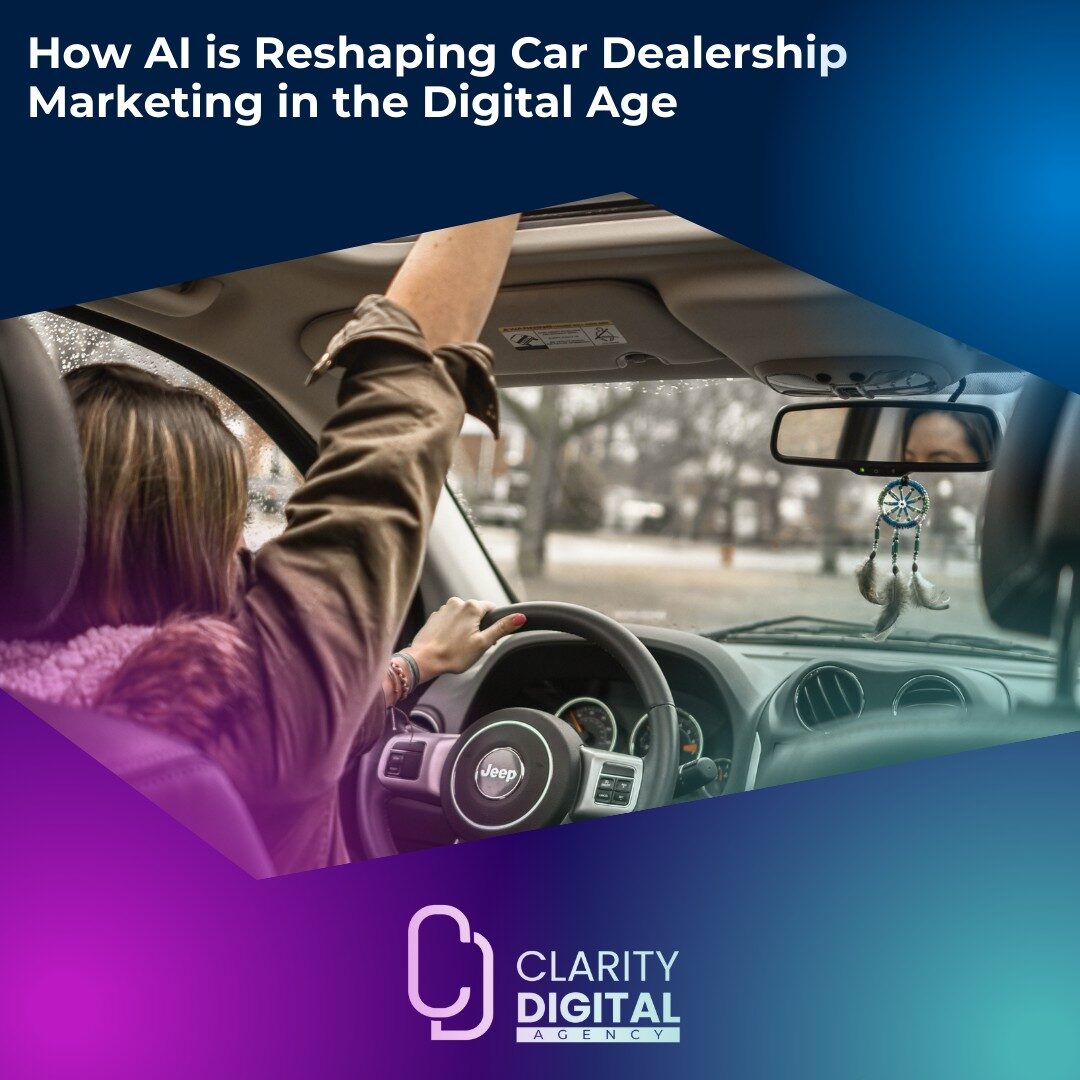Over the past couple of years, there has been no tech story quite as big or as impactful as AI’s ascent. Simply put, artificial intelligence and machine learning are everywhere, revolutionizing academia, copywriting, coding, business, law… the list goes on and on. Needless to say, the rise of AI has also been deeply consequential for practitioners of digital marketing.
Within the digital marketing world, the role of AI is vast and ever evolving. Here at Clarity Digital, we’re constantly monitoring this trend, ensuring we’re well-positioned to deploy the best AI marketing tools on our clients’ behalf, all while avoiding common AI pitfalls.
In this post, we’ll outline the overarching role of AI in marketing. From there, we’ll highlight some of the most prominent examples of AI marketing strategy and conclude with some advice on what not to do as you engage in AI marketing.
What’s the Impact of AI in Marketing?
To begin with, there are a number of ways in which AI technology can enhance digital marketing efforts. Here are some of the most noteworthy applications.
Personalization
Today’s online consumers expect an online content experience that’s tailored to their needs and interests, and reflective of where they are in the sales funnel. AI allows digital marketers to personalize content and recommendations based on individual user preferences and behavioral trends. This not only heightens engagement but can provide users with a more favorable perception of the brand in question.
Predictive Analytics
Given the sheer volume of data that’s available, marketers can’t afford to rely on guesswork. Instead, they must leverage all the information available to them to make finely calibrated decisions about where they deploy content, how they spend their marketing budget, and more. AI-powered analytics can analyze large data sets to predict future trends, customer behavior, even campaign performance.
Automation
The day-to-day work of digital marketing involves the completion of many time-intensive and repetitive tasks, including tasks such as email marketing, social media posting, and customer service. These tasks can be automated by AI, which in turn frees marketers to devote more of their time and brainpower to strategy and creative work.
Customer Insights
Another critical use of AI in digital marketing is to analyze customer data from various sources in order to uncover insights and trends that may not be apparent through traditional methods, helping marketers better understand their audience. Simply put, AI allows today’s marketers to understand where their customers are coming from and what motivates their decision-making, with greater precision and depth than ever before.
Optimization
Finally, AI marketing tools can be deployed in order to optimize campaigns in real-time. For example, AI provides frictionless ways to adjust targeting, messaging, and spending based on performance metrics, all of which can lead to a dramatically improved ROI and a distinct competitive advantage.
What Are the Best Practices for Your AI Marketing Strategy?
While AI feels like it’s ubiquitous (and it is), the technology itself is both very new and subject to rapid change. As such, it’s critical for marketers to be careful and intentional in how they deploy it.
As a leading AI marketing agency, Clarity Digital has been making judicious use of this technology for a while now. Here are a few of the best practices we’ve developed for using AI in marketing.
Take Time to Understand the AI Technology
First and foremost, it’s critical to take time to discover how AI tools work, and to fully appreciate their capabilities. We recommend a period of experimentation before you take any of your AI marketing efforts “live.” Also note that seeking counsel or coaching from an experienced AI marketing agency can go a long way.
Prioritize Data Quality
Remember that AI feeds off of existing data, and its utility is only as good as the information you provide it. Ensure that the data fed into your AI algorithms is accurate, relevant, and up to date to avoid biased or misleading results. Again, working with an AI marketing agency that has a proven track record employing data and analytics can be crucially important.
Ensure Human Oversight
While AI can automate many tasks, human oversight is essential to monitor performance, ensure ethical use, and intervene when necessary. There is also an important place for human quality control, confirming any AI-generated content doesn’t scan as overly robotic or clunky. Remember, AI provides marketing tools, but it’s not meant to actually replace human ingenuity or perspective.
Start Small
In keeping with our comment about experimentation, begin with pilot projects or small-scale implementations to test the effectiveness of AI tools before scaling up. It’s okay to gradually build out your AI program over time, both as your skill increases and as the quality of your usable data improves.
Commit to Continuous Learning
Finally, just keep in mind that the AI field is constantly changing and is sure to be very fluid over the next several years. Stay updated on the latest advancements in AI and marketing to adapt strategies accordingly and stay ahead of the competition.
What to Avoid When Using AI Marketing Tools
In addition to following these best practices, it may also be helpful to identify some of the most common AI marketing pitfalls. Here are a few things to avoid as you develop an AI marketing strategy.
Over-reliance on AI
First and foremost, refrain from relying solely on AI without considering human input and creativity. Remember that human judgment is still crucial in marketing, both in terms of strategy and implementation.
Running Afoul of Privacy Regulations
Also ensure compliance with data protection regulations such as GDPR and CCPA to avoid legal repercussions and maintain customer trust. Online privacy has been a major concern in recent years, and it’s always best to stay on the right side of public opinion here.
Overlooking AI Bias
Be mindful of bias in AI algorithms, particularly in areas such as targeting and content recommendations, and take steps to mitigate it. This is an area where human intervention can be especially meaningful.
Lack of Transparency
Ensure transparency in how AI is used in marketing to build trust with customers and stakeholders. For that matter, it can be important to be upfront with your team members about how AI is used (and how it’s not to be used) internally.
Poor Integration
Finally, we recommend that your team avoids siloed implementations of AI marketing tools, promoting seamless integration with existing marketing systems and processes for maximum effectiveness. Your AI marketing agency can advise you here.
Clarity Digital is at Forefront of AI Marketing, AI Adoption & Digital Transformation
Since our inception, Clarity Digital has prioritized the use of advanced technology, including robust data-driven solutions, to deliver optimal client results. We’re proud to have our finger on the pulse of AI. With any questions about using AI marketing tools at your business, contact Clarity Digital today.





